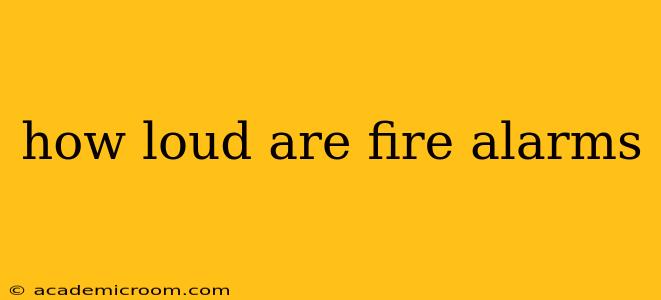How Loud Are Fire Alarms? A Deep Dive into Decibel Levels and Safety
Fire alarms are designed to be loud – incredibly loud – for a very important reason: to wake you up from a deep sleep and alert you to a potentially life-threatening emergency. But just how loud are they? And what factors influence their decibel level? Let's explore this critical aspect of fire safety.
The Standard Decibel Level:
Most residential fire alarms reach a sound pressure level of approximately 85 decibels (dB) at a distance of 10 feet. This is roughly equivalent to the noise of a busy city street or a power lawnmower. However, it's crucial to understand that this is just an average. The actual loudness can vary significantly depending on several factors.
Factors Affecting Fire Alarm Loudness:
What type of fire alarm is it?
Different types of fire alarms have different loudness capabilities. Smoke alarms, heat alarms, and combination alarms all produce varying decibel levels, depending on the model and technology involved. Newer alarms often boast louder sound capabilities than older models. Some commercial-grade alarms designed for large spaces will be significantly louder.
How old is the alarm?
Older alarms may have degraded over time, producing a weaker sound than originally intended. The batteries may also be weakening, affecting the sound output. Regular testing and replacement of batteries and the alarm itself is crucial to maintaining optimal loudness.
Distance from the alarm:
The farther you are from the alarm, the quieter it will sound. Sound intensity diminishes with distance, following an inverse square law. This means that doubling your distance from the alarm will reduce its perceived loudness by a factor of four.
Environmental factors:
Background noise significantly impacts how loud the alarm sounds. In a quiet room, an 85dB alarm will be very noticeable. However, in a noisy environment, such as a busy factory or a home with loud appliances running, the alarm may be harder to hear.
Hearing impairment:
Individuals with hearing loss may require louder alarms or additional alert systems to ensure they hear the alarm. This is a crucial consideration for household safety.
Is 85dB Enough? Why are they so loud?
The loudness of fire alarms is intentionally designed to overcome the sound of sleep and other environmental noises. It’s vital that the sound is sufficiently jarring to rouse someone from even a deep sleep, even if they are accustomed to loud noises. The intense sound is essential for guaranteeing a rapid response to a potentially life-threatening emergency.
How far can I hear a fire alarm?
The distance you can hear a fire alarm depends heavily on the factors outlined above. In ideal conditions (quiet environment, new alarm, close proximity) you might hear it from several rooms away. However, in less than ideal situations (noisy environment, older alarm, far distance), it might only be audible in the immediate vicinity.
What should I do if I can't hear my fire alarm?
If you have concerns about your ability to hear your fire alarm, consider the following:
- Test your alarms regularly: This is the best way to confirm they are functioning correctly and loud enough for your needs.
- Upgrade to newer alarms: Modern alarms often incorporate advanced technology for louder and clearer warnings.
- Consider additional alert systems: For those with hearing impairments, bed shakers or strobe lights can provide a secondary alert system.
- Check for obstructions: Make sure nothing is blocking the sound of the alarm.
Regular maintenance and testing of your fire alarms, along with awareness of these influencing factors, are crucial for ensuring your family's safety. Remember, a functioning and loud fire alarm could save your life.
